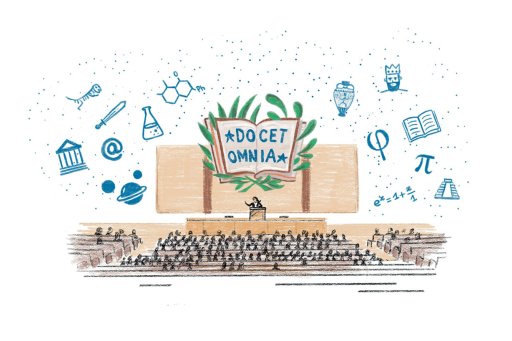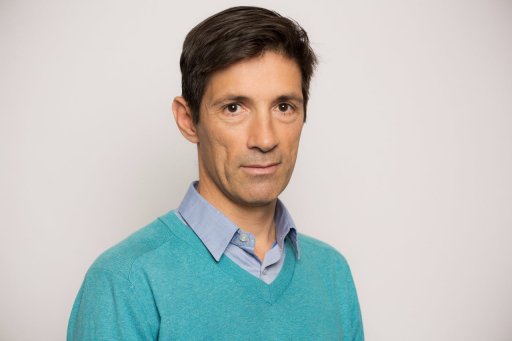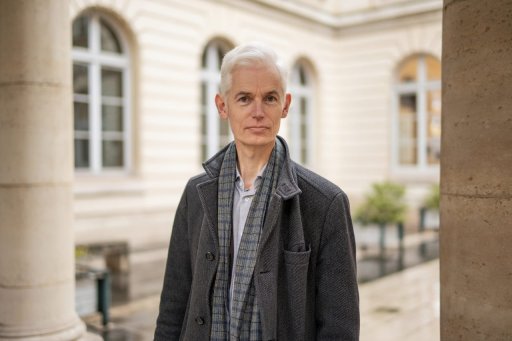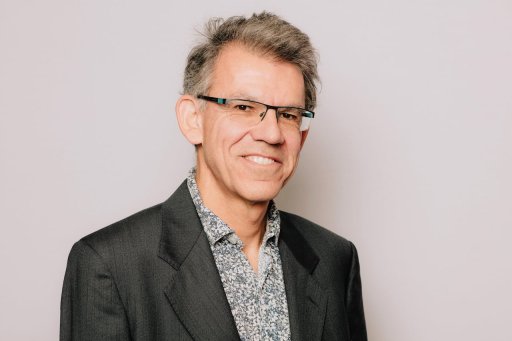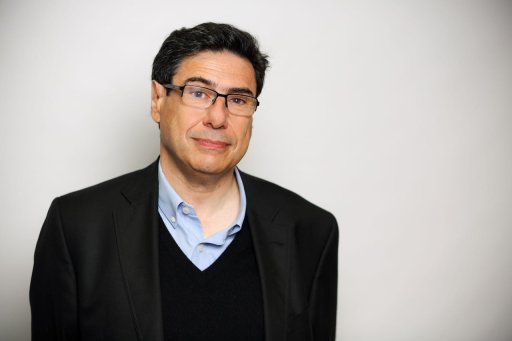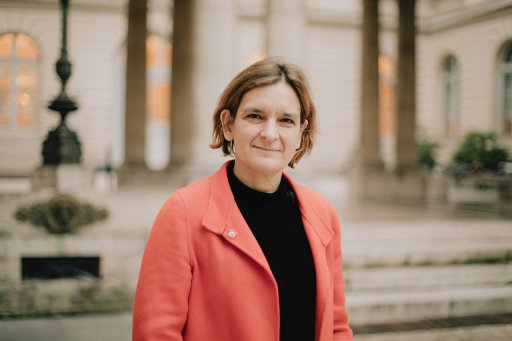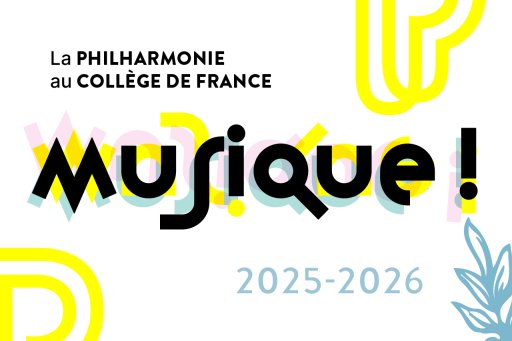A Canadian citizen born in Buenos Aires in 1948, Alberto Manguel is a translator, editor, literary critic, essayist and novelist. His work is internationally recognized. For 2021-2022, he has been invited to hold the annual chair in The Invention of Europe through languages and cultures, created in partnership with the French Ministry of Culture (Délégation générale à la langue française et aux langues de France).
The chair you'll be holding at the Collège de France in 2021-2022 is entitled "The Invention of Europe through languages and cultures". Is the plural, which goes without saying when talking about languages, important when talking about cultures?
Alberto Manguel: The myth of Babel is essential to understanding our position in the Western world with regard to language. The fact that we speak different languages in different parts of the world may lead us to believe that there was originally a single language. Umberto Eco studied this very closely. Beyond the courageous endeavors to find the primordial language, what interests me is the very fact of imagining a primordial language. It's as if human beings were desperate to have a common ancestor, be it Adam or Lucy, and with that ancestor a language for naming things exactly. This reveals that language is ultimately a very weak instrument for those who want to be understood with certainty. That's why it needs linguistic support and literary invention, such as metaphor or image, to be more effective in communication.

The invention of Europe has always been haunted by the memory of the biblical episode of confusio linguarum after Babel. Umberto Eco has shown the extent to which the various attempts to return to the Adamic language were fraught with ambiguity. In the age of technology, doesn't Europe risk losing its soul by dreaming of rebuilding a perfect language?
Umberto Eco has perfectly demonstrated that the instrument that has served us most since our origins is translation. But when he says that translation is the language of Europe, he's not quite accurate. Translation is an instrument for trying to read verbal communications in depth. If I speak to you in French and you understand what I'm saying in French, you understand what I'm saying at a very superficial level. A linguistic convention leads you to believe that you know what I mean; and I believe that I'm communicating what I think I understand. A translation, on the other hand, must necessarily go further. It can no longer rely on the simple communication of sounds and words in a precise grammar. It has to look for the meaning we often avoid pondering, because our conversations would take forever. And, based on this meaning, reconstruct a text with different elements and vocabulary. Having said that, the reality is that in every community, we've developed a language to communicate what makes up the essence of that community: its rules, its prohibitions, its conventions. We don't need a history of linguistics to see that some languages developed from Germanic languages, others from Latin or Greek, and so on. What's important, I think, is that this plurality of languages makes it possible, as the myth of Babel perhaps intended in its most positive sense, to go in several directions at once in the same expression. If I say in French " je mange du pain ", in Spanish " como pan " and in English " I eat bread ", the fact of using different vocables, in a different grammatical context, with different rules, explodes the meaning of what I want to say and allows us to deepen the meaning of this communication. Not every European speaks several languages. However, when we communicate in a multilingual world, we perhaps have an extra chance of achieving this hope of communication.
Paul Ricœur refused to see the variety and even confusion of languages as a curse, as the classic interpretation of the Tower of Babel story would have it. Do you agree with him that this is the happy destiny of a humanity called to translation?
This often happens to poor God. He wants to send us a curse, and we receive it as a blessing. The Babel myth is at the root of multiculturalism. Canadian society, for example, is based on the Babel myth. In Europe, Paul Ricœur is right to point out that the tradition of translation goes back a long way. He makes us understand not only the advantages of having this instrument that enables us to pass more or less exactly from one language to another, but at the same time to become aware of the native language, the mother tongue or paternal language. Seneca tells the story of a Spanish farmer who, when brought before a Roman court, refused to express himself in Latin, because he wanted to be understood in the language that defined him. He felt he couldn't express himself in a language that wasn't the one he'd grown up with. Translation reminds us of the self-evident identity of the language we speak. Ricœur insisted on this idea: we are the language we speak.
Your lecture series at the Collège de France is entitled "Europa: myth as metaphor". In evoking the daughter of Telephassa and Agenor, beloved of Zeus, was it important for you to salute a tradition dating back to ancient Greece?
It's not intentional. But you can't avoid going back to Greece if you think about anything in the Western world. Europa is a Phoenician princess who is kidnapped and brought to Cyprus. The geography of the Greek imagination, however, is not that of our contemporaries. What was the significance of Phoenicia being transported to Cyprus to found a new continent? At the time, Phoenicia was understood as belonging partly to Africa and partly to Asia. Remember that, for the Greeks, the source of culture was Egypt, and Asia was the image of opulent civilization. This meant that this princess, who arrived on the tiny island of Cyprus to found a continent in the barbarian north, was in fact the founder of European Greek civilization. Historians have debated this point: for Herodotus, this was not the case. For the Latin poets Ovid and Horace, from the abduction and rape of Europa by Zeus, Agenor's daughter gave birth to Minos, Rhadamanthe and Sarpedon, three sons who were founders. Three groups of men start from this myth. First, Europa's brothers, who set off in search of her at Agenor's request. One of these brothers, Cadmus, is the legendary founder of the city of Thebes and the man who brought the alphabet to Greece, because he was Phoenician. Europa's brother is thus at the origin of culture. For their part, Europa's sons were partly Asian and partly European. For Plato's Socrates, they became the judges of the afterlife, in the realm of the dead. Rhadamanthe, who is Asian, judges souls from Asia; Sarpedon, who is European, judges souls from Europe; and Minos, who is Asian, decides between the two groups. What's important in this part of the myth is the idea that the faults and virtues of both are cultural! There's a separation between the souls of the dead who come from Europe and those who come from Asia. In this sense, the myth of Europa can be read and interpreted as a myth that defines the world's cultures. This is what Horace does, in one of his Odes, when he depicts Venus at the moment of Europa's abduction and has her say: "Stop crying, you're going to be the mother of Empire founders".

Will you go so far as to invite your audiences to become Hellenized, with the intuition that the future of Europe is still Greece, and that a new renaissance can come from this country that had already given rise to the first one?
The question is more complex. If all it took to find a European identity was to return to Greek culture, things would be very simple. But there are several problems associated with this question. There isn't just one Greece. The Greece of Homer is not the Greece of Athens, which is not the Greece of Alexander. We need to speak from the point of view of a specific temporal Greece. Then there's the great revolution that took place in Rome, which could no longer celebrate Greece as the homeland of the victors of Troy. Instead, it became a figure of the enemy. For it was in fleeing the ruins of Troy that Aeneas came to found Rome. So if Rome is to find its divine sources, it must do so by denying the power of Greece, or rather, by reclaiming it. And that's where translation comes in. The translation of Greek culture into the Roman imaginary is a fundamental chapter in understanding the evolution of Western culture. The invocation of the Greek source is therefore highly complex. We mustn't simplify things. They are far more interesting in their kaleidoscopic repercussions.
Among the most important lessons left to us by the Greeks, isn't it important to remember that culture is first and foremost education?
Here again, I'll be more precise. Socrates is opposed to the sophists. Sophists are teachers, professors of philosophy in the sense that the Greeks gave this discipline in Athens. Philosophy was first and foremost a way of learning how to do politics. You couldn't have a political career without learning rhetoric, which was taught by philosophy teachers like the sophists. What Socrates objected to was not teaching the art of discourse in order to engage in politics, but receiving financial reward. The aim of education was first and foremost to become an effective politician. History, literature and science came second. In the latter context, teachers were masters of thought, in the strongest sense of the term. They taught you how to think. In this sense, yes, culture is the fruit of education.
To what extent are myths and fables "places of memory" that Europeans must learn to visit and revisit?
To answer your question, I'd like to go back to the beginning of our discussion on translation. A myth, like a fable, is the translation of a story or narrative into the epistemological field, that is, into the field of interpretation. A story becomes a myth if the person who receives or listens to it needs it to be transformed into a myth. Of course, not every story is destined to become a myth or fable, but almost all of them are: accounts of historical events, religious interpretations of certain events or, more simply, the imagination of a tale designed to amuse or entertain by the fireside. It becomes a myth when the group or society that receives it needs an emblem of identity. In a short story from his collection Brodie's Report, one of his last books, Borges imagines the story of a Scottish missionary who discovers a tribe of very primitive troglodytes he calls the Yahoos. One of the tribe's customs is that of the poet: from time to time, one of the members of the tribe utters four or five words aloud. If life goes on, nothing happens. But sometimes, these four or five words touch people, who bow down before the poet, who then becomes a god whom no one has the right to kill. This is a perfect example of a story that becomes a myth. Stories have been told every day since the dawn of time. Sometimes, one of these stories lights us up. In our imagination, something transforms this seemingly banal story into a mythical one. And once the story becomes myth, it acquires what Aby Warburg called Nachtleben, survivability. It persists in its changes. It's no coincidence that Ovid, in his Metamorphoses, incorporated the myth of the princess Europa abducted by Zeus.
The peoples of Europe have both languages and cultures. How can they form a common intuitive identity?
At the simplest level, what I wanted to point out with this expression "common intuitive identity" is that an identity, as Pierre Bourdieu has shown, is received and created at the same time. In Alice in Wonderland, a book I'm going to talk about in my lecture, Alice has a moment of panic when she no longer knows who she is. To answer the question "Who am I?" she has a wonderful idea. She expects to be called, preparing herself to ask "Who are you calling?" Alice then says to herself, if I like the one called, I'll answer; if I don't, I'll wait. This identity, which comes to us from the outside and which we may or may not have to accept, allows me, in the case of the extreme complexity of the identity of contemporary Europe, to know whether the Europe that such and such defines today is the Europe that I recognize.
Interview by Sébastien Lapaque



